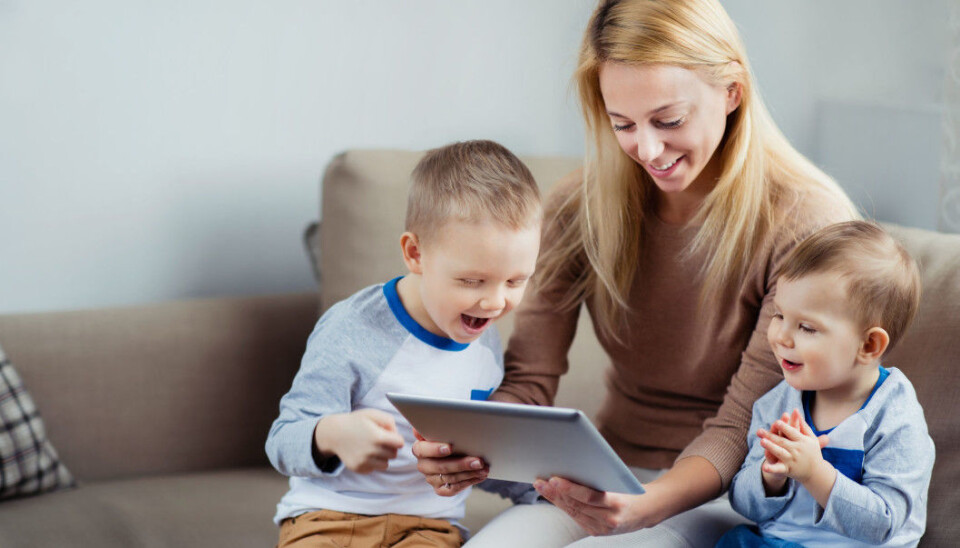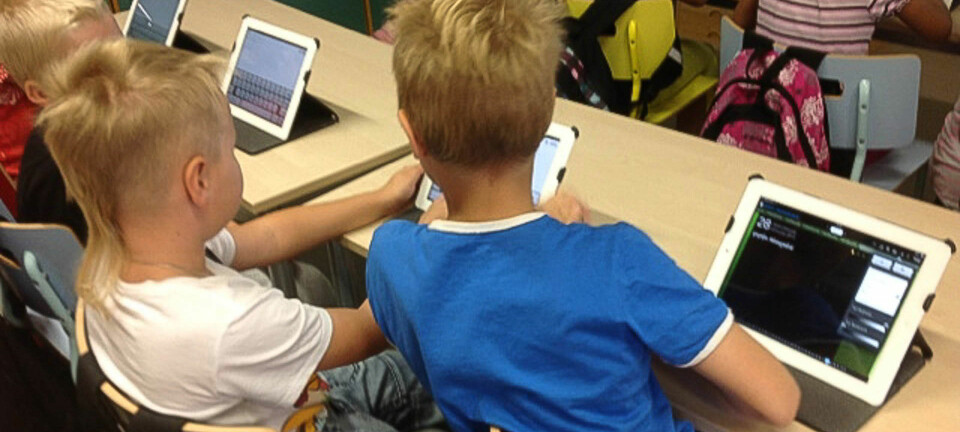
Two-year-olds benefit from playing games on tablets
The use of electronic media by young children has an undeserved bad reputation, a new study suggests. Mothers are better at interacting with their two-year-olds when playing online games than when they are watching TV together or engaged in regular play.
The use of tablets by toddlers and young children has skyrocketed in recent years. At the same time, child development experts warn parents that letting kids spend too much time parked in front of a screen can have negative consequences.
Most studies of children’s use of electronic media to date have shown that overuse can affect a child’s relationship with their parents. This in turn can have negative effects on the child's social and emotional development.
Few studies, however, have looked at the potential benefits of tablets and other interactive media on the relationship between parents and children.
"There can be a big difference between using a tablet as a ‘babysitter’ and using a tablet to play engaging, educational games with the child," says Silje Skaug, a PhD candidate at the Norwegian University of Science and Technology’s (NTNU) Department of Psychology.
Online games can strengthen parent-child interaction
To assess the effects of small children's tablet usage, Skaug compared the interaction between children and their mothers in three situations: when they played online games, when they watched TV or when they played with actual toys.
They chose to study mothers and their children – rather than fathers – so their results could be compared to other research, which has mostly focused on mothers.
Skaug’s study showed that mothers became more engaged and responded more favourably to their toddlers when they played online games than when they were watching TV or playing with dolls and cars.
"Interactive media like tablets can actually stimulate and enhance interaction between adults and children," Skaug said.
Measured degree of interaction
Skaug conducted tests with 22 mothers and their two-year-olds. The study participants were asked to alternate between playing together with different toys, watching a TV show called “Vennebyen” (City of Friends) together, or playing a Vennebyen-themed game together on a tablet.
The Vennebyen tablet game was specifically designed for children aged 2 and older.
The researchers observed interactions, and measured factors such as how attentive and responsive the mothers were to their children, how they talked to them, and how much help and encouragement they provided.
Children need interaction with parents, in the form of parents talking to the child, and in helping and giving feedback to the child on their actions. This give-and-take is a prerequisite for healthy social and linguistic development.
Traditional toys can be boring for moms
Of the three different types of play, traditional play with stuffed animals, dolls or cars was found to be the least beneficial in terms of mother-child interactions. That’s in contrast to many other studies that have shown the opposite.
"When we gave them a basket of toys to play with, the children were less engaged than with the other activities,” Skaug said. “The mothers were also considerably less engaged in the play, and less helpful to their child.”
This led to less-than-optimal interactions between the mothers and their children.
This finding might be due to the possibility that the mothers and children had played in this manner many times before, or that the children had many similar toys so that they were tired of the activity.
Passive TV viewing with the child was also not particularly interactive, the researchers found. This is also supported by previous research, which shows that watching television weakens the quality of the interaction between children and adults compared to when the TV is turned off.
Online games can be stimulating
In the end, the researchers found that mothers were most attentive and structured when they played the Vennebyen tablet game with the children.
"They talked a lot to the child, guided, encouraged and applauded them when the child mastered the game’s tasks," Skaug said.
She noted that the Vennebyen tablet game is specifically designed for this age group, and is educational and engaging.
Nevertheless, she was a bit surprised that online games were more engaging than traditional play with toys.
Interaction important for healthy development
Researchers fear that children who are left to play by themselves with a tablet get less attention from their parents, which may in turn lead to developmental delays.
"Previous research has shown that it is good for children's development that parents play with them, and that passive TV viewing can compromise a child’s interaction with their parents," said Skaug.
Skaug notes that if the use of online games is going to have a beneficial effect, parents must participate in the play and have an active conversation with the child.
“The number of words exchanged between children and parents is crucial for the child's language development,” she said.
-------------------------------------
Read the Norwegian version of this article at forskning.no.
































